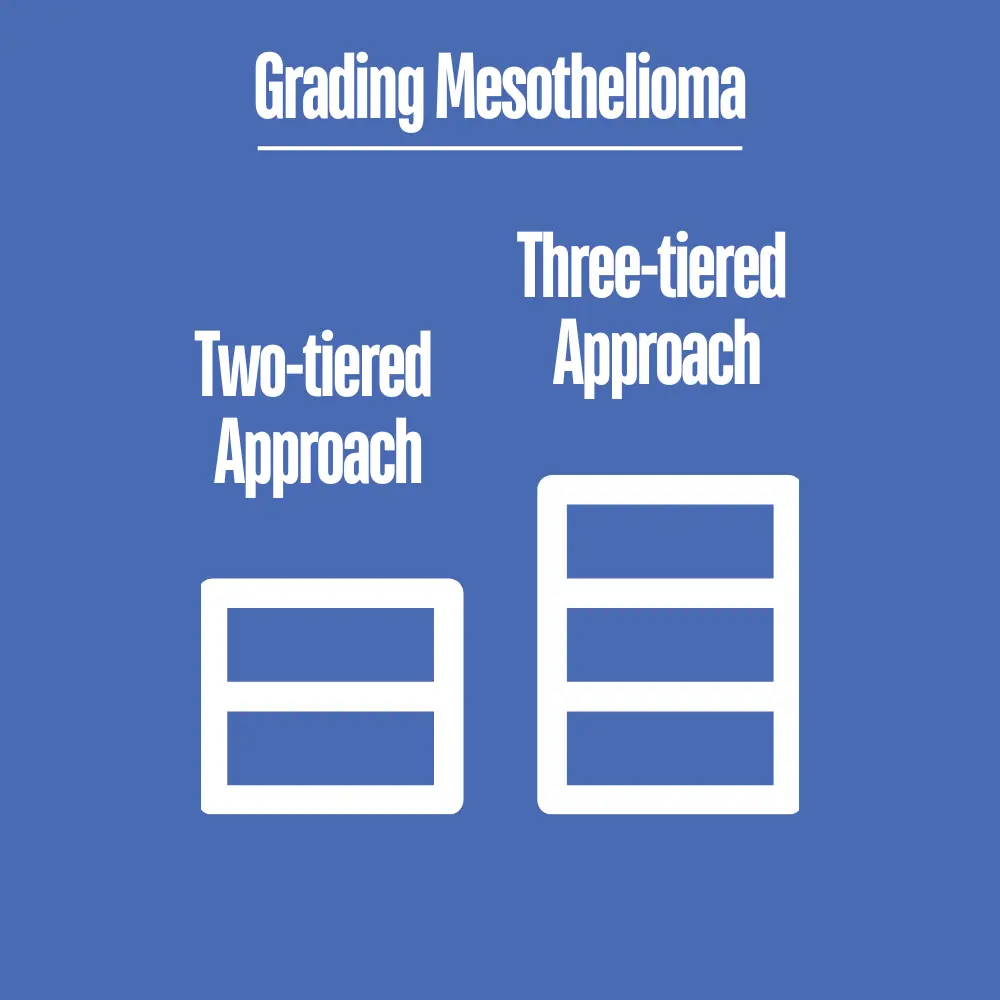Mesothelioma is a rare form of cancer caused by exposure to asbestos. Grading mesothelioma is important to determine the severity of the cancer along with the best possible treatment options. Originally, the grading system for epithelioid mesothelioma was a three-tiered system. However, there is a new recommended two-tiered grading system that would be combined with the current one. This considers whether necrosis is present or not. Necrosis is a medical term meaning the death of the tissues within the body. This new way of grading mesothelioma could be helpful for future prognosis and could influence future grading systems.

There are three subtypes of mesothelioma. It is vital in terms of prognosis to know which category you fall into as a patient. The three subtypes of mesothelioma are:
- Epithelioid
- Sarcomatoid
- Biphasic
Staging Mesothelioma Using TNM
The TNM staging system for mesothelioma considers three different aspects:
- Tumor
- Nodes
- Nodule
The three-tiered way of grading mesothelioma was composed of a nuclear grade, based on nuclear atypia and mitotic count. Based on these counts, the patient was graded from a scale of one to three, which helped determine a reliable prognosis.
Necrosis
Necrosis seems to also play a role in the survival rates of mesothelioma patients, which is why a way of grading mesothelioma while factoring in necrosis may be beneficial. For instance, a 2018 study showed that the survival of mesothelioma patients without necrosis was 19 months, while the survival of patients with necrosis was only 10 months.
The Journal of Thoracic Oncology endorsed reporting of the nuclear grading system when it comes to epithelioid mesothelioma, however the experts believed that a two-tiered approach to grading mesothelioma was better than the three-tiered approach. With this two-tiered approach epithelioid mesothelioma is split into two categories: low and high grade. This combines the two grading systems because the low-grade cases would include mesotheliomas that would have previously been labeled as grade one or two, in which necrosis is not present. The high-grade mesothelioma cases would include those who are grades two and three if necrosis is present along with all other grade three cases, even if there is no necrosis.
Shortcomings of New Approach to Grading Mesothelioma
Although this two-tiered grading system is recommended by experts, it does have some shortcomings. The three-tiered grading system was heavily studied and tested for its application, while the two-tiered way of grading mesothelioma was not tested as much, specifically in a clinical setting. Also, although this new system has been endorsed by pathologists and pulmonologists that are experts in the field of diagnosing epithelioid mesothelioma, there is not a consensus among moderate pathologists that this system should be used.
Although pleural mesothelioma is by far the most diagnosed type of mesothelioma, there are other forms of the cancer as well. Pericardial mesothelioma begins in the abdominal cavity and affects approximately 10-20% of all mesothelioma patients. The grading system has not considered these patients.
Other Ideas for Grading Mesothelioma
There are other grading systems that have been proposed that take into account both epithelioid and non-epithelioid mesothelioma, but many experts believe that there is not enough data on non-epithelioid mesothelioma cases to come up with a proper grading system for this type of mesothelioma.
In conclusion, the two-tiered grading system could be a better approach to grading mesothelioma than the one that is currently in place, to determine a proper prognosis and to ensure that the patient receives the best possible treatment. This new approach can be used to inform experts on an even better grading system in the future.
If you or a loved one has been diagnosed with mesothelioma or another asbestos-related disease, we can help. Our website is filled with information about mesothelioma treatment centers in Pennsylvania, jobs in which asbestos exposure was very common, legal help, and more. For more information, call us today at (800) 505-6000 or fill out our simple contact form.
Sources:
https://my.clevelandclinic.org/health/diseases/23959-necrosis